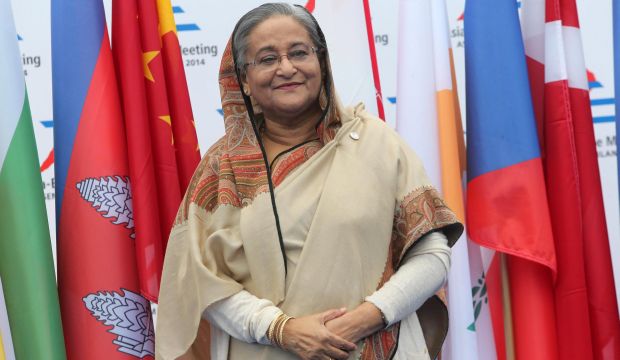
Prime Minister of Bangladesh Sheikh Hasina arrives to attend the 10th Asia–Europe Meeting (ASEM) in Milan, Italy, on 17 October 17, 2014. (EPA/Matteo Bazzi)
New Delhi, Reuters—India’s top counter-terrorism agency has uncovered a suspected plot by a banned militant group to assassinate the prime minister of Bangladesh and carry out a coup, three senior Indian security officials told Reuters on Tuesday.
India will hand over a dossier to Bangladesh with details of the plan by members of the Jamaat-ul-Mujahideen, which has carried out scores of attacks in India’s eastern neighbor, the government and police officials said.
Bangladesh did not comment directly on the assertions that Prime Minister Sheikh Hasina had been the target of a plot, but said it had tightened security on the border with India.
Mainly Muslim Bangladesh has suffered three major army coups and two dozen smaller rebellions since gaining independence from Pakistan in 1971 in a war that killed and displaced millions.
The alleged conspiracy was discovered after two members of the group were killed in an explosion while building homemade bombs at a house in West Bengal in eastern India earlier this month. Indian police say the militants were Bangladeshis and were using India as a safe haven to plan the attacks.
“The strategy was to hit the political leaders of the country and demolish the democratic infrastructure of Bangladesh,” said a senior Indian Home [interior] Ministry official, who spoke on condition of anonymity.
“This was all being planned on Indian soil and we could have been blamed if there was an attack.”
Indian National Security Adviser Ajit Doval on Monday visited the house where the blasts took place and met West Bengal Chief Minister Mamata Banerjee to discuss the situation.
The revelations come against a backdrop of political friction earlier this year between Indian nationalist Prime Minister Narendra Modi and Banerjee.
On one campaign stop in West Bengal before his general election victory in May, Modi said illegal immigrants from Bangladesh should get their “bags packed” if he came to power.
Analysts said the speech sought to mobilize Modi’s Hindu support base against Banerjee, who leads a regional party in West Bengal that is backed by many of the Muslims who make up a quarter of the state’s 90 million population.
Asaduzzaman Khan, Bangladesh’s junior home minister, said Dhaka had been tipped off about a possible militant plot.
“We have received this information unofficially from India about a terror threat to top politicians in Dhaka. This is the first time there has been such information,” said Khan.
“We are always serious about curbing the activities of the militants. After the news from India our [security] efforts have been raised manifold.”
West Bengal Home Secretary Basudeb Banerjee declined to comment.
Modi reached out to leaders of neighboring countries as soon as he was elected, inviting them to his inauguration as prime minister, and he sent his foreign minister to Dhaka to establish friendly relations. However, border disputes and water sharing remain unresolved issues between the two countries.
The Jamaat-ul-Mujahideen also planned to assassinate the country’s main opposition leader, Khaleda Zia, the Indian officials said. Prime Minister Hasina and her chief rival, Zia, have dominated the country’s politics for more than a decade.
The security officials, who requested anonymity because they were not authorized to speak on the record, did not say how the militants planned to carry out the assassinations.
The outlawed Jamaat-ul-Mujihadeen detonated nearly 500 bombs almost simultaneously on one day in 2005 across Bangladesh, including in the capital, Dhaka.
Its militants later carried out suicide attacks on several courthouses, killing 25 people and injuring hundreds.
Earlier this year, gunmen opened fire and tossed bombs at a security van carrying members of the group on the way to court.
“The group were a very serious threat in 2005 and up to 2008, but they have now been very badly decimated,” said Ajay Sahini, executive director of the Institute for Conflict Management in New Delhi that monitors militant groups across South Asia.
“The group’s leadership has been eroded, which means their planning capability and capacities for execution have been seriously limited.”
India has arrested at least six people tied to the coup plot, according to the National Investigation Agency, the law enforcement institution investigating the case.
Local police found nearly five dozen crude bombs and arrested two women who were living in the same house and were trying to burn bomb-making manuals after the incident. In a nearby home police found 35 unexploded bombs.

Trackbacks/Pingbacks